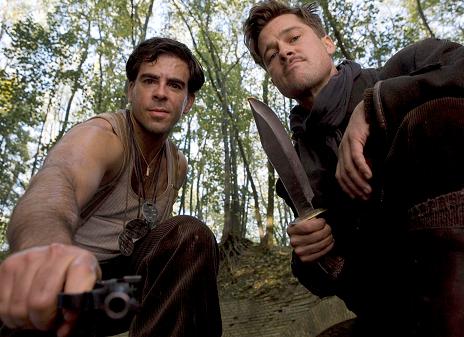From the very first scene (or chapter, I should say), I was hooked in. By the gorgeous Robert Richardson cinematography, by the use of Ennio Morricone music, by the general spaghetti western feel… And of course, by the astonishing Christoph Waltz as Col. Hans Landa, aka The Jew Hunter, doing what he does best: hunting the last remaining Jews in Nazi-occupied France. This whole first chapter revolves around a seemingly pleasant conversation between Landa and a French dairy farmer (Denis Menochet), who’s secretly been hiding a Jewish family. But like in the classic Christopher Walken/Dennis Hopper scene in “True Romance”, under all the pleasantries lies nameless dread – this will not end well…
Oddly enough, in the 1993 pic, Christopher Walken kinda disappeared after his oh so striking entrance. Quentin Tarantino didn’t make this mistake again. Well aware that he has a good thing going with this here Jew Hunter character, he has him popping in again through the rest of the film for more unforgettable scenes where he proves to be both disturbing and hilarious. As brilliantly written as the role is, it’s Waltz who makes it legendary with his intensity, which is oddly increased instead of diminished by all the unexpected little effete mannerisms he gives Landa. Maybe because, devious and cunning as he is, the Nazi officer intentionally allows himself to appear ridiculous to make his enemies let their guard down?
That’s true of “Inglourious Basterds” as a whole, actually. Tarantino has a way of throwing all these gags, offbeat touches and colorful dialogue scenes at you, until you get all comfortable enjoying what almost seems to be a World War II comedy. But then, once your guard is down, BAM! Here comes this extremely graphic burst of violence, generally courtesy of the titular Basterds, a covert ops unit of Jewish-American soldiers (Eli Roth, B.J. Novak, Samm Levine, etc.) who kill (and scalp!) Nazis under the command of Lt. Aldo Raine (Brad Pitt). Now, the Weinstein Co.’s marketing team would have you believe that these guys are the stars here, spending the whole running time using their guns, knives and baseball bat (!) to exterminate German scum. But while there are indeed some truly badass moments showing just that, the Basterds are ultimately only some of the players of a large ensemble of characters.

As crucial, maybe even more so, to the story is Shoshanna Dreyfuss (Mélanie Laurent), a young woman whose whole family was massacred by the Jew Hunter and his men a few years prior. Now hiding her Jewishness and running a small Paris movie theater, she’s a cute but hardened little thing who, much to her dismay, finds herself being wooed by a Nazi war hero (Daniel Brühl). She wants nothing to do with him, obviously, but when he arranges for the propaganda film about his exploits to have its premiere at her theater, with Joseph Goebbels (Sylvester Groth) and practically all the most important figures of the Third Reich attending… Well, let’s just say that Shoshanna sees an opportunity there.
At this point, I could go into all my favorite moments from the flick, be it the show-stopping introduction of Sgt. Hugo Stiglitz (Til Schweiger), every time the wonderfully scenery-chewing Hitler (Martin Wuttke) is on screen, Mike Myers (and Winston Churchill!)’s cameo, the La Louisiane tavern sequence (which Tarantino has accurately described as a condensed version of “Reservoir Dogs”), or the whole goddamn last act, where Tarantino’s perfectly constructed screenplay manages for all his eggs (rotten or not) to end up in the same basket and events accelerate up to one of the most hysterically fun, (in)gloriously excessive and literally explosive climaxes in film history.
I could also tell you about how this is probably Quentin’s most personal film to date, as it’s quite overtly all about the power of cinéma and mise en scène. But I think I’ll wait until I have the chance to watch it a few more times, which I already can’t wait to do. “Inglourious Basterds” is packed with all the things we now take for granted when watching a Tarantino movie: sharply written dialogue, memorable characters, uniformly great performances (from all the ones mentionned before but also Michael Fassbender, Diane Kruger and others), iconic imagery, extraordinarily effective use of music and so on. But it’s also unlike anything he’s ever done in some ways, notably because it’s set and was shot in Europe, because it’s a period piece, because it plays around with History and because as much of it is in German or French as in English.
“I think this just might be my masterpiece.”
The jury’s still out on that, but after my first viewing, I can say with some confidence that this is right up there with “Pulp Fiction” and “Kill Bill”.
